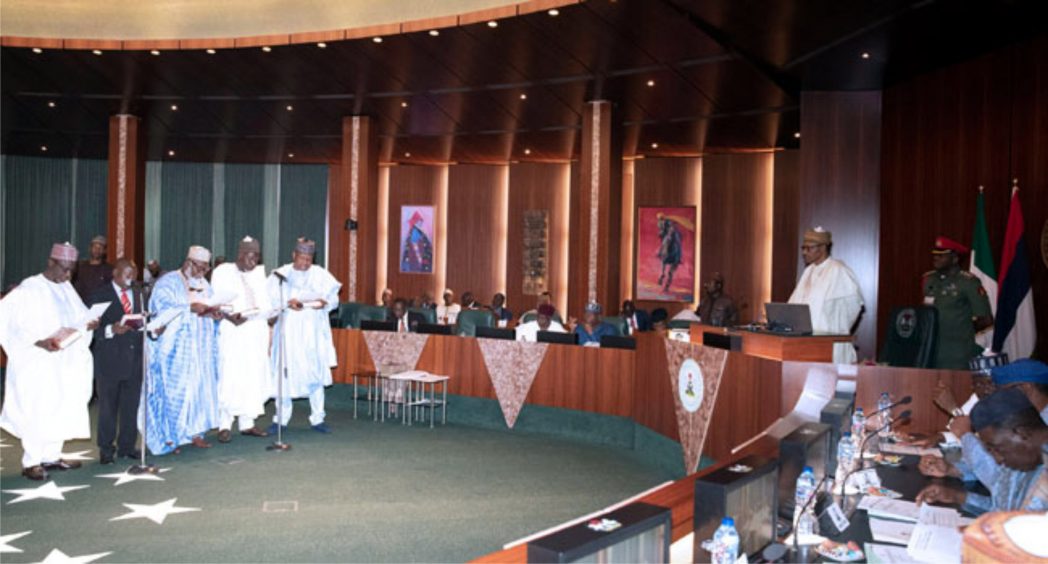Business
COVID-19: FG Slashes NASS Budget By N25.6bn

Strong indications have emerged that the Federal Government has slashed the 2020 National Assembly (NASS) budget by N25.6 billion.
The amount represents 20 per cent of the N128 billion approved for the National Assembly for this fiscal year.
It will be recalled that the approved 2020 budget for the Federal Government was N10.3 trillion budget. But it had been reduced to N8trn due to the outbreak of the coronavirus pandemic which had affected the international oil prices.
The government had projected $57 as benchmark oil sales per barrel of crude oil,but the price is now hovering between 20 and 25 dollars.
In the light of the current situation, there is now an understanding that the budget of Executive, Judiciary and Legislature budgets would be slashed by 20 per cent.
The House Chief Whip, Muhammad Tahir Monguno (APC, Borno), confirmed that the National Assembly’s budget would be slashed by 20 per cent, adding that the N37 billion proposed for the renovation of the National Assembly complex had been suspended.
According to him, it will be a misplaced priority to talk about spending such money on the renovation of a building, stressing that only priority spendings will be tolerated.
He said: “It was decided that the budget would be slashed by 20 per cent across the board. No discrimination between the Executive, Judiciary and the Legislature. We now have to decide from which areas we will reduce our proposals.
“The reviewed budget will now be presented for passage. We are ready to receive it from the executive even in this lockdown. We are waiting; if they bring it, we will reconvene.
“There is a very big problem, our economy is going down, there is a need for everybody to make a sacrifice. We have to forgo many things proposed in our budget.
“I know that the Minister of Finance said the purchase of computers, office furniture and purchase of vehicles and some other line items would be removed from the budget of the Executive.
“For me, even if it is brought back, I will call for its suspension. The money should be taken and used elsewhere to benefit Nigerians. We should manage what we will be able to get until things get better.
“It will be very insensitive for anybody to use N37 billion for renovation in the present circumstance. It is very irresponsible to use even N10 billion to renovate the National Assembly. The money should be used where it will benefit all Nigerians.”
Business
Agency Gives Insight Into Its Inspection, Monitoring Operations

Business
BVN Enrolments Rise 6% To 67.8m In 2025 — NIBSS

The Nigeria Inter-Bank Settlement System (NIBSS) has said that Bank Verification Number (BVN) enrolments rose by 6.8 per cent year-on-year to 67.8 million as at December 2025, up from 63.5 million recorded in the corresponding period of 2024.
In a statement published on its website, NIBSS attributed the growth to stronger policy enforcement by the Central Bank of Nigeria (CBN) and the expansion of diaspora enrolment initiatives.
NIBSS noted that the expansion reinforces the BVN system’s central role in Nigeria’s financial inclusion drive and digital identity framework.
Another major driver, the statement said, was the rollout of the Non-Resident Bank Verification Number (NRBVN) initiative, which allows Nigerians in the diaspora to obtain a BVN remotely without physical presence in the country.
A five-year analysis by NIBSS showed consistent growth in BVN enrolments, rising from 51.9 million in 2021 to 56.0 million in 2022, 60.1 million in 2023, 63.5 million in 2024 and 67.8 million by December 2025. The steady increase reflects stronger compliance with biometric identity requirements and improved coverage of the national banking identity system.
However, NIBSS noted that BVN enrolments still lag the total number of active bank accounts, which exceeded 320 million as of March 2025.
The gap, it explained, is largely due to multiple bank accounts linked to single BVNs, as well as customers yet to complete enrolment, despite the progress recorded.
Business
AFAN Unveils Plans To Boost Food Production In 2026
-

 Sports2 days ago
Sports2 days agoTinubu Lauds Super Eagles’ after AFCON bronze triumph
-

 Sports2 days ago
Sports2 days agoFulham Manager Eager To Receive Iwobi, Others
-

 Sports2 days ago
Sports2 days agoAFCON: Lookman gives Nigeria third place
-

 Sports2 days ago
Sports2 days ago“Mikel’s Influence Prevent Some Players Invitation To S’Eagles Camp”
-

 News2 days ago
News2 days agoSERAP Sues Govs, FCT Minister Over Security Vote Spending
-

 Niger Delta2 days ago
Niger Delta2 days agoINC Polls: Ogoriba Pledges To Continuously Stand For N’Delta Rights … Picks Presidential Form
-

 Editorial2 days ago
Editorial2 days agoBeyond Accessing Bonny By Road
-

 Sports2 days ago
Sports2 days agoMan of The Match award Excites Nwabali

